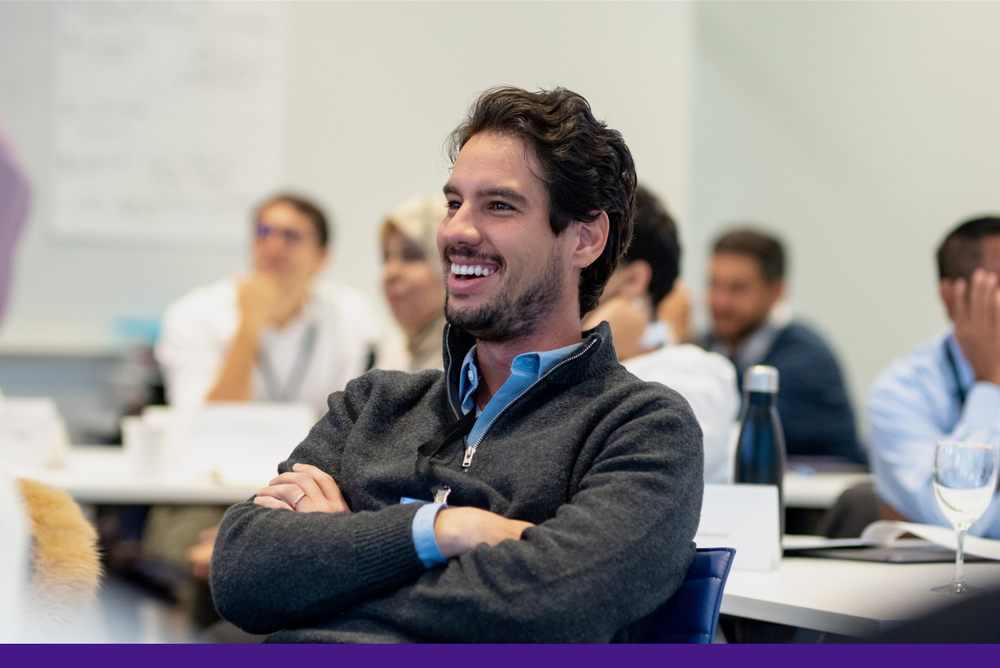
Henrique Campos on Redefining Growth Through Strategic Value Creation
- What inspired you to enroll in the Strategic Value Creation program?
- What specific challenges were you hoping to address, and how did the program help?
- Which frameworks or concepts introduced during the program had the most impact on your work?
- How has your understanding of value creation evolved since completing the program?
- Can you share an example of how you’ve applied one of the seven value drivers in your organization?
- How did the program enhance your ability to assess strategy and stress test business decisions?
- What insights did you gain from discussions around AI, capital investment, or private equity?
- What was the most surprising or memorable “aha” moment during the program?
- What was it like learning from Professor Shiva Rajgopal?
- What advice would you give to other professionals considering this program?
- Upcoming Corporate Governance Programs
Q&A with Henrique Campos
Henrique Campos is the Chief Operating Officer at Bolt, a leading renewable energy company based in Brazil. With over 15 years of experience across thermal, wind, solar, hydro, and biomass technologies, Henrique oversees operations and power trading while helping lead the company’s strategic expansion into new markets. He is also the founder of Bow-e, an energytech startup offering smart energy solutions for businesses and households.
As part of his pursuit of the Columbia Business Excellence certification, Henrique joined the Strategic Value Creation: Transform Strategy Into Sustainable Advantage program to deepen his understanding of how strategy translates into long-term value. We asked him a few questions about the experience and how it has impacted his leadership at Bolt.

What inspired you to enroll in the Strategic Value Creation program?
I’ve participated in several executive programs before, including previous modules at Columbia Business School Executive Education, and I’m currently completing the Columbia in Business Excellence (CIBE) certification track. What inspired me to enroll in the Strategic Value Creation program was the opportunity to deepen my understanding of how strategy translates into value and how I can apply that knowledge to lead Bolt through a complex and fast-changing environment. I was also drawn by the program’s faculty and its practical, real-world focus on business transformation.
What specific challenges were you hoping to address, and how did the program help?
Our company is growing rapidly, and I needed a sharper lens to prioritize where to invest time, capital, and attention. The frameworks discussed in class helped me map which initiatives truly drive long-term value and which ones consume resources without meaningful return. The Strategic Value Creation: Transform Strategy Into Sustainable Advantage program gave me strategic clarity and practical tools to evaluate opportunities with more precision.
Which frameworks or concepts introduced during the program had the most impact on your work?
The value drivers and the capital allocation matrix were especially impactful. They helped structure how I evaluate trade-offs between short-term performance and long-term advantage. Additionally, learning how to stress test strategic decisions under uncertainty gave me more confidence when managing risk in volatile market conditions.
How has your understanding of value creation evolved since completing the program?
Before the program, I associated value creation mainly with growth and profitability. Now, I view it as a multi-dimensional process that involves how a company allocates resources, structures incentives, and adapts to change. The Strategic Value Creation: Transform Strategy Into Sustainable Advantage program expanded my perspective on how value can be created through resilience, culture, and governance—not just financial outcomes.
Can you share an example of how you’ve applied one of the seven value drivers in your organization?
At Bolt, resource allocation plays a critical role in our ability to scale efficiently and stay competitive. After completing the program, I reassessed how we were deploying capital across our business units, especially in our distributed generation marketplace, Bow-e. By applying the frameworks from the program, I was able to identify areas where reallocating financial and human capital could accelerate growth without compromising operational integrity. This led to a more balanced investment structure across our pipeline and helped us prioritize strategic initiatives with the highest long-term impact.
How did the program enhance your ability to assess strategy and stress test business decisions?
The Strategic Value Creation program provided a structured way to evaluate both internal and external risks to our strategy. I learned how to map out uncertainty, create scenarios, and challenge assumptions before committing resources. This has already influenced how we evaluate potential acquisitions and long-term contracts. The stress testing exercises were extremely relevant to real-world decisions we’re currently making at Bolt.
What insights did you gain from discussions around AI, capital investment, or private equity?
The sessions on AI made me reflect on how we can use data more proactively—not just in trading operations but across customer experience, energy forecasting, and back-office automation. Discussions around capital efficiency and private equity also helped me think differently about how we structure deals and align incentives in investor relationships.
What was the most surprising or memorable “aha” moment during the program?
One memorable moment was realizing how often we mistake growth for value. A case discussion helped me understand that sometimes, the best strategic move is not to scale faster but to scale better. It shifted how I approach growth decisions in my company.
What was it like learning from Professor Shiva Rajgopal?
Shiva Rajgopal brought an incredible mix of academic rigor and real-world insight. His teaching style encouraged participation and challenged us to look deeper into the assumptions behind business decisions. He made complex ideas accessible and relevant, and his energy kept the class highly engaged throughout.
What advice would you give to other professionals considering this program?
The Strategic Value Creation program is ideal for leaders facing real strategic decisions. Be prepared to challenge your assumptions, engage with top-tier faculty, and apply what you learn immediately. The balance between theory and practical cases is excellent. I highly recommend coming in with a real challenge from your organization—you’ll leave with actionable insights and a refined mindset to tackle it. You’ll also benefit from discussing real-world cases with your classmates and bringing your own challenges into the classroom for richer learning.
Contact Us
If you have questions about the program or are interested in enrolling or sponsoring someone in your organization, please don’t hesitate to contact Christine Tom at christine.tom@gsb.columbia.edu or +1 212-851-2505.
Upcoming Corporate Governance Programs
Sign Up for Email Alerts
Sign up for program updates and content relevant to today's business leaders from Columbia Business School Executive Education.
